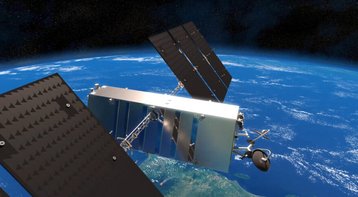Telesat has secured a C$2.14 billion (US$1.58bn) loan from the Canadian government to build its upcoming Low Earth Orbit (LEO) satellite constellation.
The satellite company this week announced it had received a letter from Canada’s Minister of Innovation, Science and Industry regarding an investment in Telesat Lightspeed.
Following several months of negotiations between Telesat and federal officials, the Government of Canada (GoC) is prepared to invest C$2.14 billion in Telesat Lightspeed.
The government aims to provide a loan to Telesat LEO Inc., a wholly owned subsidiary of Telesat that is developing – and will own and operate – the company’s Lightspeed LEO satellite fleet.
The 15-year loan, subject to certain conditions, will carry a floating interest rate that is 4.75 percent above the Canadian Overnight Repo Rate Average (CORRA).
Telesat LEO Inc. will provide the GoC with warrants for 10 percent of the common shares of the company, based upon an equity valuation for Telesat LEO of US$3 billion.
The investment is subject to certain conditions, including the entry of definitive documentation with the GoC and Telesat’s other financing sources to the GoC’s satisfaction.
“Telesat Lightspeed is a highly innovative and disruptive global broadband network and the largest space program in Canada’s long and distinguished history as a space-faring nation,” said Dan Goldberg, Telesat’s president and CEO.
“I am delighted with the engagement we have had with the Government of Canada on this flagship program, which will help bridge the global digital divide, create and sustain thousands of high-quality jobs in Canada, spur domestic innovation, investment, and exports, and ensure that Canada is at the forefront of the rapidly growing New Space Economy.”
First announced in 2018, Thales Alenia Space was chosen to be the prime manufacturer for the Lightspeed Constellation back in February 2021.
However, supply chain issues mean the fleet was pushed back from its original 2023 launch date and dropped the number of satellites from 298 to 198, having already previously pushed back the original launch date of 2020 after delays in choosing a contractor. The company then switched suppliers to MDA to save costs.
Satellite launches are scheduled to commence in mid-2026 and polar and global services are scheduled to begin in late 2027. Each satellite weighs 700 kilos, and Telesat will offer up to 7.5 Gbps for a single terminal, with up to 20 Gbps for a single hub location such as a port.
Goldberg added: “We estimate that, in addition to the roughly US$2 billion of capital cost savings, we will realize roughly US$750 million of savings in reduced borrowing costs relative to the original Telesat Lightspeed program.”
Telesat last week announced its Q4 2023 and end-of-year results. For the year ending December 31, 2023, Telesat reported consolidated revenue of $704 million, a decrease of 7 percent ($55 million) compared to the same period in 2022. Adjusted EBITDA for the year was $534 million, a decrease of 6 percent; net income was $583 million, compared to a net loss of $82 million for the prior year.
For 2024, Telesat expects full-year revenues to be between $545 million and $565 million; Adjusted EBITDA is predicted to be between $340 million and $360 million.
In other recent satellite news:
– Starlink has clashed with Italian telco TIM, with the latter reportedly not complying with regulations that require it to share frequency data. This lack of information is slowing down the satellite company’s roll-out within Italy.
– Starlink has launched in Argentina.
– Private Boeing Business Jet (BBJ) operator Aloft AeroArchitects has selected OneWeb to provide in-flight connectivity. Sat One has become a OneWeb distributor for remote Australia.
– AST SpaceMobile has pushed back its first five BlueBird satellites again after a supply chain delay. The latest delay pushes the launch back from Q1 to July/August.
– A SpaceX Falcon 9 rocket has launched Eutelsat’s 36D satellite from Florida into orbit. The satellite is due to begin commercial operations in the second half of this year.
– ETCO Space has been awarded a license for a ground station in Oman.
– Satellite communications firm Aerkomm is to go public via a merger with SPAC company IX Acquisition Corp. The SPAC features Guy Willner as executive chairman.
– The National Association of Broadcasters is pitching ATSC 3.0’s Broadcast Positioning System (BPS) to the Transportation Department as an effective terrestrial GPS alternative.
– Iridium Communications has completed its acquisition of Satelles Inc. and rebranded its services as Iridium Satellite Time and Location (STL).
– A new report from the Secure World Foundation suggests Russia and China are catching up to the US in key space capabilities including electronic warfare and space domain awareness.







